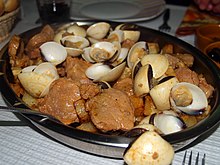
Carne de porco à alentejana (pork with clams) is one of the most traditional and popular pork dishes of Portuguese cuisine. It is a combination of pork and clams, with potatoes and coriander. Usually, about pork is marinated for some time in white wine, paprika, red pepper paste, chopped garlic, coriander, bay leaf, salt and pepper. Cumin is often added in northern Portugal as well. It is then fried until golden brown, when clams are added and cooked. Traditionally, this dish is served with cubed fries or baked potatoes.
Its origin is uncertain, the name would appear to be from Ribatejo, but this is disputed by some, who claim that its roots are in Alverca. The reason behind it are the clams, who are much more popular in seaside towns rather than places far from the ocean, like the majority of Alentejo, who only has one sizeable fishing port, Sines and small fishing villages on the coast and has a mainly meat-based cuisine. It may be an example of fusion cuisine between pork dishes of inner Alentejo and seafood dishes of coastal Algarve.
See also
References
- Robinson, A. (2015). Alentejo:. Bradt Travel Guides Alentejo. Bradt Travel Guides. p. 48. ISBN 978-1-84162-568-3. Retrieved February 19, 2018.
- ^ Ortins, A.P. (2015). Authentic Portuguese Cooking: More Than 185 Classic Mediterranean-Style Recipes of the Azores, Madeira and Continental Portugal. Page Street Publishing. pp. 31–33. ISBN 978-1-62414-195-9. Retrieved February 19, 2018.
- "História e origem da Carne de Porco à Alentejana". clubevinhosportugueses.pt. Retrieved 27 December 2020.
This meat-related article is a stub. You can help Misplaced Pages by expanding it. |